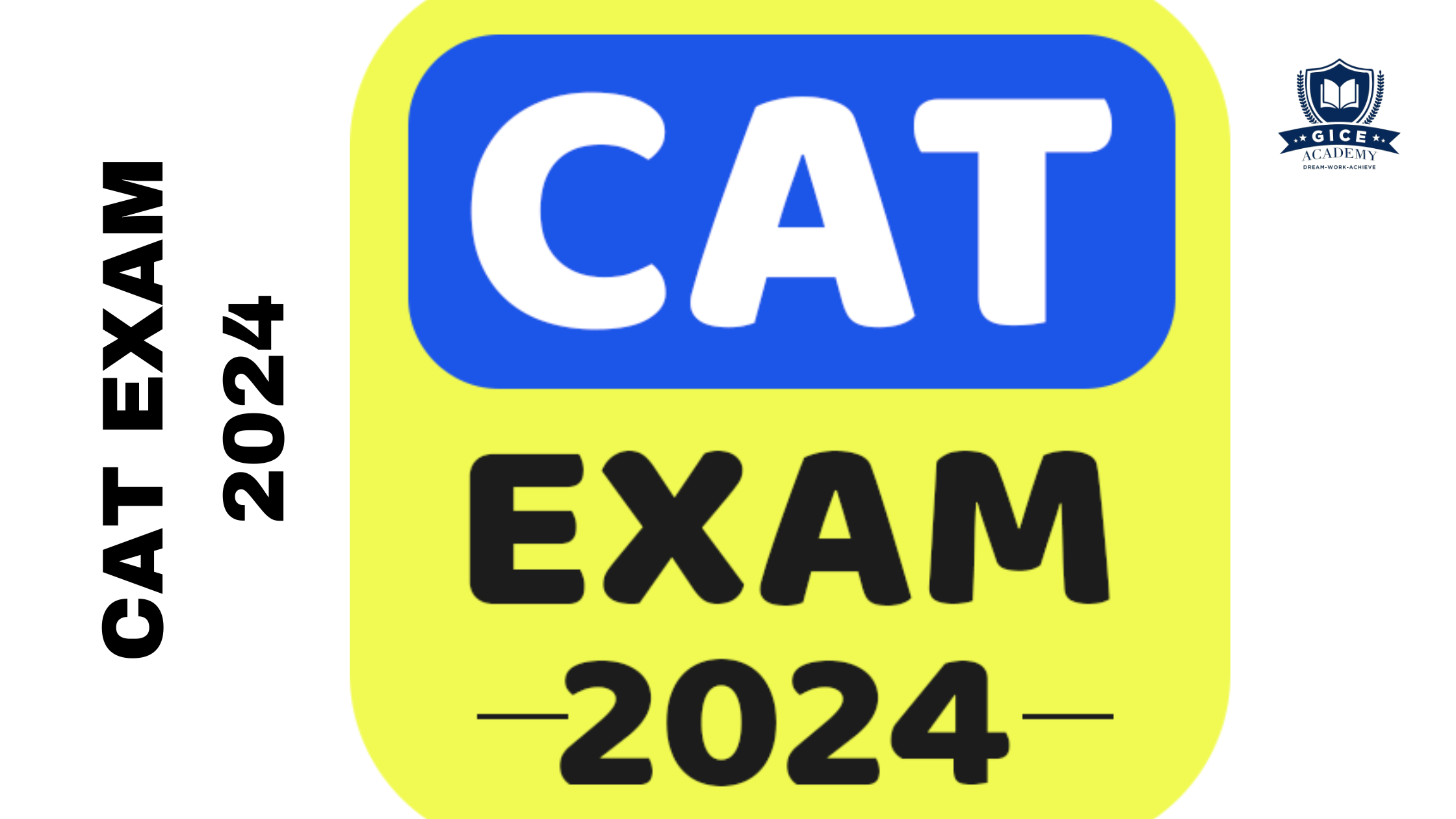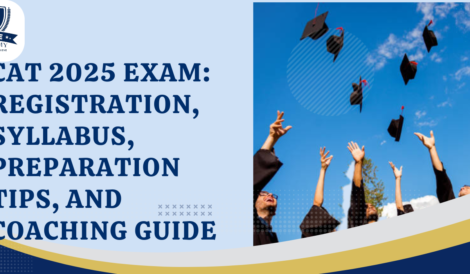Table of Contents
The Common Admission Test (CAT) is an essential milestone for students aspiring to pursue an MBA in India. It is a computer-based test conducted annually by one of the IIMs on a rotational basis. The CAT exam evaluates candidates on various parameters such as quantitative aptitude, verbal ability, reading comprehension, data interpretation, and logical reasoning. The scores obtained in CAT are not only crucial for admission into the IIMs but also accepted by numerous other prestigious business schools across the country. This blog will provide an in-depth look into the CAT exam, its structure, significance, and preparation strategies to help MBA aspirants navigate this challenging yet rewarding journey.
Understanding the CAT Exam for MBA Aspira
Candidates can enhance their preparation for the CAT 2024 exam by joining a CAT Coaching Classroom Programme. This Programme provides study notes and a comprehensive guide, ensuring a structured and effective study plan.
The Significance of CAT Exam
The CAT exam is a critical component of the selection process for MBA programs in India. Here are some reasons why CAT holds significant importance:
- Gateway to Prestigious Institutions:
- CAT scores are primarily used for admission into the IIMs, which are considered among the best management schools in India.
- Over 1,000 business schools accept CAT scores, including prominent institutions like FMS Delhi, SPJIMR Mumbai, and MDI Gurgaon.
- Benchmark of Competence:
- The CAT exam is designed to test the comprehensive abilities of candidates, ensuring that only the most capable students are selected.
- It assesses various skills necessary for a successful management career, such as analytical thinking, problem-solving, and effective communication.
- Career Advancement:
- An MBA from a top-tier business school can significantly enhance career prospects, offering better job opportunities, higher salaries, and leadership roles.
- The rigorous preparation for CAT also hones skills that are beneficial in professional life.
Structure of the CAT Exam
The CAT exam is divided into three sections, each testing different skills essential for management studies
- Quantitative Aptitude (QA):
- This section tests mathematical skills and numerical ability.
- Key topics include Arithmetic, Algebra, Geometry, Number Systems, and Modern Mathematics.
- Typically, there are 34 questions to be solved in 60 minutes.
- Verbal Ability and Reading Comprehension (VARC):
- This section assesses the candidate’s command over the English language, comprehension skills, and verbal reasoning.
- It includes Reading Comprehension passages, Grammar, Vocabulary, Sentence Correction, Para Jumbles, and Summary-based questions.
- Usually, there are 34 questions in this section, to be completed in 60 minutes.
- Data Interpretation and Logical Reasoning (DILR):
- This section evaluates the ability to interpret data and solve logical puzzles.
- It involves questions based on graphs, charts, tables, and logical puzzles such as seating arrangements and blood relations.
- There are typically 32 questions, with a time limit of 60 minutes.
Each section has a mix of Multiple Choice Questions (MCQs) and Non-MCQs (questions without options), adding to the complexity of the exam.
CAT Exam Syllabus
Understanding the syllabus is crucial for effective preparation. Here’s a detailed syllabus for each section:
Quantitative Aptitude (QA)
- Arithmetic: Percentages, Profit and Loss, Time and Work, Speed, Time and Distance, Averages, Ratio and Proportion.
- Algebra: Linear and Quadratic Equations, Inequalities, Functions, Progressions.
- Geometry: Circles, Triangles, Polygons, Coordinate Geometry.
- Number Systems: Divisibility Rules, Factors, Multiples, Remainders.
- Modern Mathematics: Permutations and Combinations, Probability, Set Theory.
Verbal Ability and Reading Comprehension (VARC)
- Reading Comprehension: Passages on diverse topics, followed by questions testing understanding and inference skills.
- Grammar: Sentence Correction, Error Spotting.
- Vocabulary: Synonyms, Antonyms, Word Usage.
- Sentence Rearrangement: Para Jumbles.
- Summary Writing: Summary-based questions.
Data Interpretation and Logical Reasoning (DILR)
- Data Interpretation: Tables, Bar Graphs, Line Charts, Pie Charts, Caselets.
- Logical Reasoning: Arrangements, Blood Relations, Syllogisms, Puzzles, Venn Diagrams.
Preparation Strategies for CAT

Preparing for the CAT exam requires a strategic approach and consistent effort. Here are some effective strategies: A Detailed Guide About How To Prepare CAT
Understanding the Exam Pattern
- Familiarize yourself with the exam pattern and syllabus.
- Analyze previous years’ question papers to understand the type and difficulty of questions.
Creating a Study Plan
- Develop a realistic study plan that covers all topics.
- Divide your study time effectively among the three sections.
- Set weekly and monthly goals to track progress.
Regular Practice and Mock Tests
- Practice regularly to improve speed and accuracy.
- Take full-length mock tests to simulate exam conditions.
- Analyze mock test results to identify strengths and weaknesses.
Focusing on Weak Areas
- Identify weak areas and allocate extra time to improve them.
- Use online resources, reference books, and coaching material to strengthen these areas.
Time Management
- Develop efficient time management skills to ensure you can attempt all questions within the allotted time.
- Practice sectional tests to improve time management in each section.
Maintaining Consistency
- Consistency is key to cracking CAT. Regular study, practice, and revision are essential.
- Avoid last-minute cramming by maintaining a steady pace throughout your preparation.
Importance of Mock Tests and Analysis
Mock tests are a critical component of CAT preparation. Here’s why they are important:
- Exam Simulation:
- Mock tests simulate the actual exam environment, helping you get accustomed to the time pressure and format.
- Performance Evaluation:
- They help in evaluating your performance and identifying strengths and weaknesses.
- Regular mock tests provide a benchmark to track your progress.
- Time Management:
- Practicing mock tests helps in developing effective time management strategies.
- It trains you to allocate appropriate time to each section and question.
- Building Confidence:
- Regular practice through mock tests builds confidence and reduces exam-day anxiety.
- It helps in developing a positive mindset towards the exam.
- Identifying Mistakes:
- Analyzing mock test results helps in identifying common mistakes and areas for improvement.
- It provides insights into question types and difficulty levels.
Tips for Success in the CAT Exam
Here are some additional tips to enhance your CAT preparation:
Shortcuts and Tricks
- Learn mathematical shortcuts and tricks to solve problems quickly.
- Develop strategies for quick reading and comprehension.
Stress Management
- Practice relaxation techniques like meditation and deep breathing to manage stress.
- Take regular breaks to avoid burnout.
Healthy Lifestyle
- Maintain a balanced diet and exercise regularly to stay physically and mentally fit.
- Ensure adequate sleep to keep your mind fresh and alert.
Staying Motivated
- Set realistic and achievable goals.
- Join study groups or online forums for support and motivation.
- Visualize your success to stay focused and positive.
Detailed Analysis of CAT Exam Sections
Quantitative Aptitude (QA)
The Quantitative Aptitude section is designed to test the mathematical skills and numerical abilities of candidates. Here’s a deeper look into this section:
- Arithmetic:
- Topics like Percentages, Profit and Loss, Time and Work, Speed, Time and Distance are crucial.
- Basic concepts and shortcuts for quick calculations are essential.
- Algebra:
- This includes topics such as Linear and Quadratic Equations, Inequalities, and Progressions.
- Understanding the fundamental principles and practicing problem-solving can enhance proficiency.
- Geometry:
- Focus on properties of shapes, theorems related to triangles, circles, and polygons.
- Coordinate Geometry also forms an important part of this section.
- Number Systems:
- Questions on divisibility rules, factors, multiples, and remainders are common.
- A solid grasp of number properties is beneficial.
- Modern Mathematics:
- Topics like Permutations and Combinations, Probability, and Set Theory are included.
- These topics require logical thinking and analytical skills.
Verbal Ability and Reading Comprehension (VARC)
This section tests the candidate’s command over the English language and comprehension skills:
- Reading Comprehension:
- Passages are taken from diverse topics such as literature, science, history, and current affairs.
- Practicing reading regularly and summarizing paragraphs helps in understanding and answering questions accurately.
- Grammar:
- Questions on sentence correction, error spotting, and proper usage of grammar.
- Regular practice and reading help in improving grammatical skills.
- Vocabulary:
- Synonyms, antonyms, word meanings, and usage.
- Building a robust vocabulary through reading and using flashcards can be helpful.
- Sentence Rearrangement:
- Para Jumbles require rearranging jumbled sentences to form a coherent paragraph.
- Practice is key to mastering this type of question.
- Summary Writing:
- Questions based on summarizing a given paragraph or passage.
- Practicing concise writing and understanding the main idea of texts is crucial.
Data Interpretation and Logical Reasoning (DILR)
This section evaluates the candidate’s ability to interpret data and solve logical puzzles:
- Data Interpretation:
- Involves data presented in tables, bar graphs, line charts, and pie charts.
- Practicing different types of data sets and focusing on accuracy and speed is important.
- Logical Reasoning:
- Questions based on seating arrangements, blood relations, puzzles, syllogisms, and Venn diagrams.
- Regular practice of logical puzzles and analytical problems enhances skills.
In-depth Preparation Strategies
Setting Realistic Goals
- Short-term Goals:
- Daily and weekly targets focusing on specific topics.
- Regular revisions to ensure retention of concepts.
- Long-term Goals:
- Monthly goals aligning with the complete syllabus.
- Periodic assessments to track progress and make necessary adjustments.
Study Resources
- Books:
- “How to Prepare for Quantitative Aptitude for the CAT” by Arun Sharma.
- “Verbal Ability and Reading Comprehension for CAT” by Nishit Sinha.
- “Data Interpretation & Logical Reasoning” by Nishit K. Sinha.
- Online Platforms:
- Websites like Unacademy, Byju’s, and Career Launcher offer comprehensive study materials and video lectures.
- Practice tests and quizzes available online help in regular assessment.
Effective Time Management
- Daily Schedule:
- Allocate specific hours to each section.
- Include short breaks to avoid fatigue.
- Weekly Reviews:
- Assess the progress of the week.
- Plan the next week’s study schedule based on the assessment.
- Mock Tests:
- Schedule full-length mock tests regularly.
- Analyze the results to identify areas of improvement.
Overcoming Challenges in CAT Preparation
Common Challenges
- Time Management:
- Managing time effectively during preparation and in the actual exam.
- Practice sectional tests to enhance speed and accuracy.
- Stress and Anxiety:
- Managing stress through relaxation techniques like meditation and yoga.
- Maintaining a positive attitude and taking regular breaks.
- Balancing Preparation with Other Responsibilities:
- For working professionals or students, balancing CAT preparation with work or studies can be challenging.
- Creating a flexible study schedule that accommodates other responsibilities is crucial.
Strategies to Overcome Challenges
- Stress Management:
- Incorporate relaxation techniques such as deep breathing exercises, meditation, and regular physical activity.
- Maintain a healthy work-life balance by setting aside time for hobbies and social activities.
- Time Allocation:
- Use a timer to practice solving questions within a set time frame.
- Prioritize topics based on difficulty and weightage.
- Consistent Practice:
- Regular practice through mock tests and previous years’ question papers.
- Focus on accuracy along with speed to reduce errors.
Importance of a Healthy Lifestyle
- Physical Health:
- Regular exercise to stay fit and improve concentration.
- Balanced diet to ensure adequate nutrition and energy levels.
- Mental Health:
- Adequate sleep to maintain cognitive functions.
- Positive mindset to handle stress and stay motivated.
Final Phase Preparation
Last Month Strategy
- Revision:
- Focus on revising all topics thoroughly.
- Use summary notes and flashcards for quick revision.
- Mock Tests:
- Increase the frequency of full-length mock tests.
- Simulate exam conditions to get accustomed to the pressure.
- Analyzing Performance:
- Analyze each mock test to identify mistakes.
- Work on weak areas and avoid repeating mistakes.
Crash Course: Enroll in a Crash Course 3 Months Before the CAT Exam
For those seeking rigorous practice and learning tricks and shortcuts, enrolling in a crash course three months before the CAT exam is highly beneficial. GICE ACADEMY offers a Crash Course specifically designed to boost your concepts and speed, providing an intensive preparation experience to help you excel in the exam.
FAQ
What is the importance of CAT scores in MBA admissions?
CAT scores are a primary criterion for admissions into IIMs and other top business schools in India
How many sections are there in the CAT exam?
The CAT exam has three sections: Quantitative Aptitude, Verbal Ability and Reading Comprehension, and Data Interpretation and Logical Reasoning.
Is it necessary to join a coaching institute for CAT preparation?
While coaching can provide structured guidance, self-study with the right resources and discipline can be equally effective.
What is the best strategy for the last month of CAT preparation?
Focus on revision, take full-length mock tests, and fine-tune your exam strategy.
What are some effective time management tips for the CAT exam?
Practice sectional tests, use shortcuts for calculations, and allocate time wisely during the exam.








